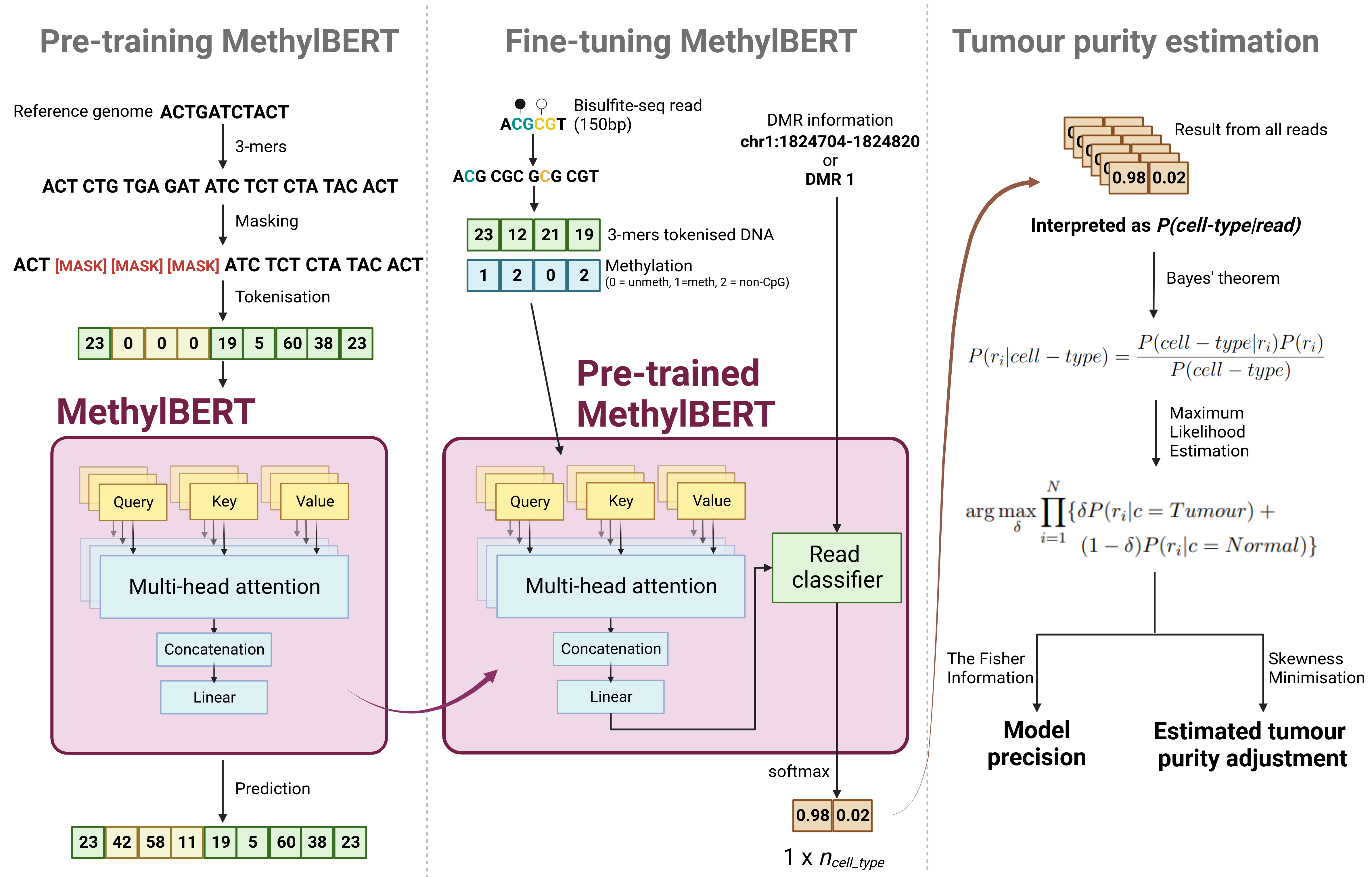 methylbert _scheme" style="max-width: 100%;"> Die Figur wurde mit Biorender generiert
methylbert _scheme" style="max-width: 100%;"> Die Figur wurde mit Biorender generiert
BERT-Modell zur Klassifizierung von DNA-Methylierungsdaten auf Leseebene in Tumor/Normal und zur Durchführung der Tumorentfaltung. methylbert wird mit Pytorch und Transformatoren implementiert?
methylbert Artikel ist jetzt online auf bioRxiv !!
methylbert : Ein transformatorbasiertes Modell zur Identifizierung von DNA-Methylierungsmustern auf Leseebene und zur Tumorentfaltung, Yunhee Jeong, Karl Rohr, Pavlo Lutsik, bioRxiv 2023.10.29.564590; doi: https://doi.org/10.1101/2023.10.29.564590
methylbert läuft am stabilsten mit Python=3.11
methylbert ist als Python-Paket verfügbar.
conda create -n methylbert -c conda-forge python=3.11 cudatoolkit==11.8 pip freetype-py
conda activate methylbert
pip install methylbert
Sie können Ihre Conda-Umgebung mit der Datei environment.yml einrichten, indem Sie conda env create --file environment.yml ausführen oder stattdessen:
conda create -n methylbert -c conda-forge python=3.11 cudatoolkit==11.8 pip freetype-py
conda activate methylbert
git clone https://github.com/hanyangii/methylbert.git
cd methylbert
pip3 install .
Wenn Sie methylbert als Python-Bibliothek verwenden möchten, folgen Sie bitte den Tutorials.
methylbert unterstützt ein Befehlszeilentool. Bevor Sie das Befehlszeilentool verwenden, überprüfen Sie bitte die Anforderungen an die Eingabedatei
> methylbert
methylbert v2.0.1
One option must be given from ['preprocess_finetune', 'finetune', 'deconvolute']
-h oder --help stellt verfügbare Argumente für jede Funktion bereit. (z. B. methylbert preprocess_finetune --help )
zB) methylbert preprocess_finetune -f bulk.bam -d dmrs.csv -r genome.fa -p 0.8 -c 50 -o data/
-s SC_DATASET, --sc_dataset SC_DATASET
a file all single-cell bam files are listed up. The first and second columns must indicate file names and cell types if cell types are given. Otherwise, each line must have one file path.
-f INPUT_FILE, --input_file INPUT_FILE
.bam file to be processed
-d F_DMR, --f_dmr F_DMR
.bed or .csv file DMRs information is contained
-o OUTPUT_PATH, --output_path OUTPUT_PATH
a directory where all generated results will be saved
-r F_REF, --f_ref F_REF
.fasta file containing reference genome
-nm N_MERS, --n_mers N_MERS
K for K-mer sequences (default: 3)
-m METHYLCALLER, --methylcaller METHYLCALLER
Used methylation caller. It must be either bismark or dorado (default: bismark)
-p SPLIT_RATIO, --split_ratio SPLIT_RATIO
the ratio between train and test dataset (default: 0.8)
-nd N_DMRS, --n_dmrs N_DMRS
Number of DMRs to take from the dmr file. If the value is not given, all DMRs will be used
-c N_CORES, --n_cores N_CORES
number of cores for the multiprocessing (default: 1)
--seed SEED random seed number (default: 950410)
--ignore_sex_chromo IGNORE_SEX_CHROMO
Whether DMRs at sex chromosomes (chrX and chrY) will be ignored (default: True)
zB) methylbert finetune -c data/train_seq.csv -t data/test_seq.csv -o model/ -l 12 -s 150 -b 256 --gradient_accumulation_steps 4 -e 600 -w 8 --log_freq 1 --eval_freq 1 --warm_up 1 --lr 1e-4 --decrease_steps 200
-c TRAIN_DATASET, --train_dataset TRAIN_DATASET
train dataset for train bert
-t TEST_DATASET, --test_dataset TEST_DATASET
test set for evaluate train set
-o OUTPUT_PATH, --output_path OUTPUT_PATH
ex)output/bert.model
-p PRETRAIN, --pretrain PRETRAIN
path to the saved pretrained model to restore
-l N_ENCODER, --n_encoder N_ENCODER
number of encoder blocks. One of [12, 8, 6] need to be given. A pre-trained methylbert model is downloaded accordingly. Ignored when -p (--pretrain) is given.
-nm N_MERS, --n_mers N_MERS
n-mers (default: 3)
-s SEQ_LEN, --seq_len SEQ_LEN
maximum sequence len (default: 150)
-b BATCH_SIZE, --batch_size BATCH_SIZE
number of batch_size (default: 50)
--valid_batch VALID_BATCH
number of batch_size in valid set. If it's not given, valid_set batch size is set same as the train_set batch size
--corpus_lines CORPUS_LINES
total number of lines in corpus
--loss LOSS Loss function for fine-tuning. It can be either 'bce' or 'focal_bce' (default: bce)
--max_grad_norm MAX_GRAD_NORM
Max gradient norm (default: 1.0)
--gradient_accumulation_steps GRADIENT_ACCUMULATION_STEPS
Number of updates steps to accumulate before performing a backward/update pass. (default: 1)
-e STEPS, --steps STEPS
number of training steps (default: 600)
--save_freq SAVE_FREQ
Steps to save the interim model
-w NUM_WORKERS, --num_workers NUM_WORKERS
dataloader worker size (default: 20)
--with_cuda WITH_CUDA
training with CUDA: true, or false (default: True)
--log_freq LOG_FREQ Frequency (steps) to print the loss values (default: 100)
--eval_freq EVAL_FREQ
Evaluate the model every n iter (default: 10)
--lr LR learning rate of adamW (default: 4e-4)
--adam_weight_decay ADAM_WEIGHT_DECAY
weight_decay of adamW (default: 0.01)
--adam_beta1 ADAM_BETA1
adamW first beta value (default: 0.9)
--adam_beta2 ADAM_BETA2
adamW second beta value (default: 0.98)
--warm_up WARM_UP steps for warm-up (default: 100)
--decrease_steps DECREASE_STEPS
step to decrease the learning rate (default: 200)
--seed SEED seed number (default: 950410)
zB) methylbert deconvolute -i data/data.txt -m model/ -o res/ -b 128 --adjustment
-i INPUT_DATA, --input_data INPUT_DATA
Bulk data to deconvolute
-m MODEL_DIR, --model_dir MODEL_DIR
Trained methylbert model
-o OUTPUT_PATH, --output_path OUTPUT_PATH
Directory to save deconvolution results. (default: ./)
-b BATCH_SIZE, --batch_size BATCH_SIZE
Batch size. Please decrease the number if you do not have enough memory to run the software (default: 64)
--save_logit Save logits from the model (default: False)
--adjustment Adjust the estimated tumour purity (default: False)
@article {Jeong2023methyl,
author = {Jeong, Yunhee and Gerh{"a}user, Clarissa and Sauter, Guido and Schlomm, Thorsten and Rohr, Karl and Lutsik, Pavlo},
title = { methylbert : A Transformer-based model for read-level DNA methylation pattern identification and tumour deconvolution},
elocation-id = {2023.10.29.564590},
year = {2024},
doi = {10.1101/2023.10.29.564590},
publisher = {Cold Spring Harbor Laboratory},
URL = {https://www.biorxiv.org/content/early/2024/08/29/2023.10.29.564590},
eprint = {https://www.biorxiv.org/content/early/2024/08/29/2023.10.29.564590.full.pdf},
journal = {bioRxiv}
}